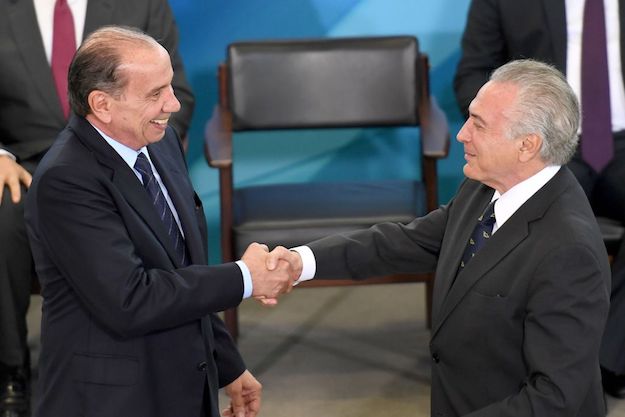The government of Michel Temer has dealt Brazilian foreign policy a body blow. Not only has the president traveled abroad less than any of his predecessors since Itamar Franco in the 1990s, but, more importantly, Brazil nowadays contributes remarkably little to dealing with urgent regional challenges. These include the crisis in Venezuela, transnational crime, China’s growing presence in Latin America, and physical infrastructure integration. Nothing suggests that this will change during the remaining 14 months of Temer’s scandal-ridden mandate.
Yet while some of the causes of Brazil’s current international lethargy are structural (such as its corruption-prone system of presidential coalitions), several others are superficial. Provided that a moderate candidate wins in 2018 – such as Marina Silva, Fernando Haddad, Luciano Huck, Geraldo Alckmin or a 2003-style Lula – many of the major obstacles facing Brazil’s government in the foreign policy realm could be overcome with relative ease.
The first has to do with the president’s international profile. Temer is one of the world’s most domestically unpopular heads of state. His government faces a constant battle for political survival, reducing the time and energy it can dedicate to foreign policy. Much of this is tied up in the country’s ongoing Lava Jato corruption investigations. Brazil’s chief public prosecutor recently said there was “no doubt” that Foreign Minister Aloysio Nunes received undeclared Odebrecht money to finance one of his campaigns (Nunes has denied participating in any corruption).
As a consequence, the current government lacks the legitimacy – particularly in the region – to take the lead on any international issue. While the results of next year’s election are extremely difficult to predict, the next government will almost by default enjoy higher approval ratings than the Temer administration, at least early on. That will create new opportunities for presidential diplomacy, a key element in Brazil’s foreign policy under former presidents Fernando Henrique Cardoso and the aforementioned Luiz Inácio Lula da Silva.
Second, irrespective of the government’s popularity, Temer’s top diplomats face a powerful and often overlooked limitation that makes implementing sophisticated foreign policy initiatives difficult: a very short policy horizon due to the interim nature of the administration. Temer’s successor in 2019, by contrast, will have the opportunity to consider and articulate policies during a full four-year mandate.
Third, despite global economic conditions that are less benign than in the early 2000s (when Brazil was the second biggest contributor to global growth), the incoming government’s first year is likely to come amid some cautious optimism vis-à-vis the economy. That makes the 2018 election radically different from the one in 2014, when it was obvious that whoever won would preside over an economy that was heading for the cliffs.
Fourth, on Jan. 1, 2019, the incoming Brazilian administration will assume the temporary presidency of the BRICS grouping of countries, providing it with a golden opportunity to articulate and present its narrative to a global audience. The 11th BRICS Summit will take place in Brazil in 2019, allowing the new president to host China’s Xi Jinping, arguably the world’s most powerful leader. The leaders of India, Russia and South Africa will also come to Brazil, as well as heads of state from throughout South America who could potentially be invited as part of the BRICS outreach process. This could make the summit one of the world’s most important diplomatic meetings of 2019. If prepared carefully, it would allow the new government to promote its policy priorities and thus re-emerge as an important agenda setter on the global stage, using foreign policy to promote its domestic policy goals and gain legitimacy.
Finally, the next president may also preside over Brazil’s accession to the OECD club of developed economies. Brazil filed a formal request to join the group in June; accession would mark a major diplomatic win, and make Brazil the only country in the world to participate in both BRICS and the OECD, a powerful symbol of the country’s pivotal role in the 21st century’s emerging multipolar order. No other country in the world is as well placed as Brazil to play a credible role in both groupings. The new president could further lead the revival of IBSA, a trilateral grouping consisting of India, Brazil and South Africa, highlighting Brazil’s status as the world’s third most populous democracy.
Granted, the upcoming presidential election is likely to be an unpredictable affair with a dispersed field of candidates, similar to what Brazil saw in 1989. Yet that should not keep analysts from discussing the next government’s opportunities and priorities in the foreign policy realm. As the five points above show, whoever succeeds Temer will face a unique opportunity to articulate the country’s global re-engagement. That would be good news for both Brazil and the international community. After all, the failure to address key challenges over the past decades are a clear sign that actors such as Brazil are needed if the world is to find meaningful solutions to global problems.









